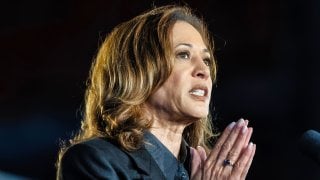Kamala Harris Has One Weakness She Can't Easily Fix
The strategic and moral incoherence of Kamala Harris’s foreign policy is a weakness for her campaign. It would be a tragedy for our country, in the event she ever became president. However, her handling of the Iran question in the Fox interview shows why Nov. 5 might yet be Donald Trump’s day.
Kamala Harris was never in danger from any of the tough questions Fox News’s Bret Baier asked her—until the final round of their 27-minute interview Wednesday night.
The vice president knew what she was getting into when she agreed to join the Republican-leaning network. Baier’s high-pressure interrogation of her record on immigration was to be expected. It could also be discounted: no Fox-watcher invested in that issue was ever going to vote for Harris. Her missteps in the eyes of those viewers were irrelevant to her mission.
That mission was to court Republican institutionalists, those who respect the national-security establishment and military brass, remain fond of Dick Cheney, and harbor doubts about Donald Trump but haven’t yet defected to the Harris-Walz ticket.
Neoconservative pundits who have already migrated into the Democratic camp insist there are millions of these potential Republicans for Harris. Her campaign evidently believes them. And it has learned a simple but powerful lesson from Trump himself: go to unexpected places to connect with voters who might otherwise feel neglected.
Harris’s foray into enemy territory was copied straight out of Trump’s 2016 playbook, which saw him infiltrating Hillary Clinton’s “blue wall” in the industrial Midwest and Pennsylvania to hold rallies in places that hadn’t seen a personal visit from a candidate of either party in decades. Merely by showing up on Fox, Harris signaled to wavering Republicans that she’s interested enough in them to meet them on their own terrain.
What Harris actually had to say was relatively unimportant. A hostile interview with Baier was no place for fine-grained arguments, and Kamala-curious Republicans didn’t need persuasion so much as reassurance—because if they’re open to voting for a Democrat in the first place, they can already be assumed to have intellectual rationalizations for doing so. The vice president stuck to her standard talking points: Everything wrong with immigration is Trump’s fault for stopping a border deal in the Senate (never mind that Baier asked about Biden-Harris policies in effect long before that bill came along); Trump is unstable; Trump is going to abuse power to go over “enemies within” (never mind that Trump didn’t wage “lawfare”—it’s Democrats who are trying to put him in prison); and so on.
One new twist, however, was Harris saying in emphatic tones, “My presidency will not be a continuation of Joe Biden’s presidency.” Baier wondered how she could seriously campaign to “turn the page” when she’s already in government, but Harris responded by treating Trump as the defining figure of the last decade in American politics. However leaky the logic, the message was nothing if not consistent. Harris wasn’t troubled to explain how she would be any different from Biden as president, other than to say, “I represent a new generation of leadership.”
Republicans on social media unsurprisingly thought Harris’s performance was disastrous, but a voter not predisposed to dismiss her might well have been impressed by her resolute demeanor and flashes of passion. Some social media commenters judged that she was better under fire than she typically is in friendly media environments. Baier’s questions were fair, but his habit of interrupting the vice president was the kind of thing that Republicans complain about when it’s done to Trump. Instead of asking sharp follow-ups to banal answers by Harris, he would start arguing with her in the middle of her replies. There are better ways to conduct a hardball interview.
Yet at the end, Baier asked a series of reasonable questions for which Harris had no reasonable answers. He played for her a video of remarks she had made naming Iran the greatest threat facing America. He then proceeded to ask Harris about the policies applied to Iran by the administration in which she serves, which have been less severe than Trump’s approach was. She responded by claiming Trump’s exit from the Obama administration’s “Iran deal” made Iran more dangerous. She still fell back on a disciplined talking point, or at least an oft-repeated one, but she seemed rattled by the line of questioning. The Cheney Republicans that Harris is eager to capture are nothing if not foreign-policy hawks, but Harris was caught in the trap of trying to defend a dovish Obama initiative while also presenting herself as the ultimate hardliner against Tehran. (Indeed, to the absurd point of ranking Iran above China on the scale of threats.)
Harris’s message is at war with itself, and it’s not what either Cheney Republicans or Arab-American Democrats in Michigan—a potentially decisive minority in what could easily be a decisive swing state—want to hear. One plausible reason Harris didn’t pick Pennsylvania governor Josh Shaprio as her running mate, despite his advantages over Tim Walz (not least of which is Pennsylvania’s own battleground status), is that selecting him would have risked forfeiting Michigan, with its influential Arab-American vote discomfited by Shapiro’s past service in the Israel Defense Forces, to Donald Trump. But even without Shapiro, the Democratic ticket risks losing the election owing to the party’s divides on Israel and the Middle East.
The strategic and moral incoherence of Kamala Harris’s foreign policy is a weakness for her campaign. It would be a tragedy for our country, in the event she ever became president. However, her handling of the Iran question in the Fox interview shows why Nov. 5 might yet be Donald Trump’s day.
About the Author: Daniel McCarthy
Daniel McCarthy is the editor of Modern Age: A Conservative Review and a contributing editor of The American Conservative. His writing has appeared in the New York Times, USA Today, the Spectator, the National Interest, Reason, and many other publications. Outside of journalism he has worked as internet communications coordinator for the Ron Paul 2008 presidential campaign and as senior editor of ISI Books. He is a graduate of Washington University in St. Louis, where he studied classics. Follow him on Twitter.
Image Credit: Creative Commons.


